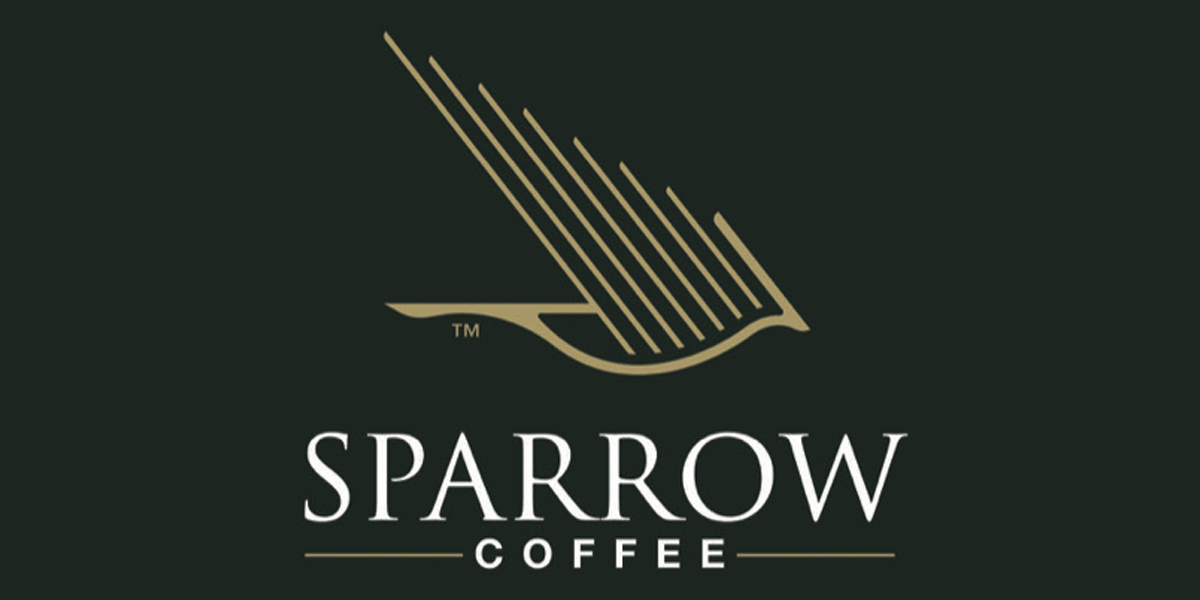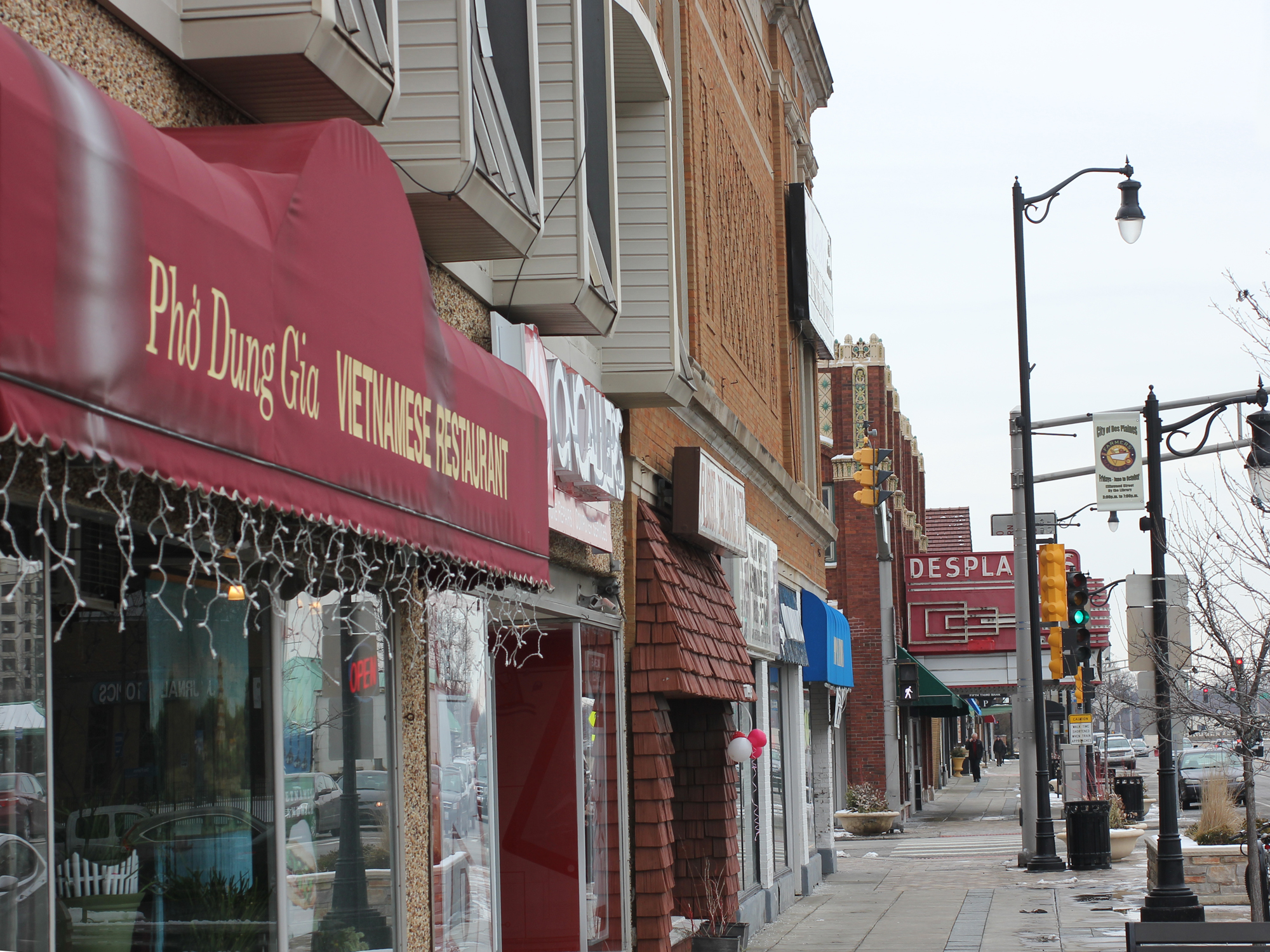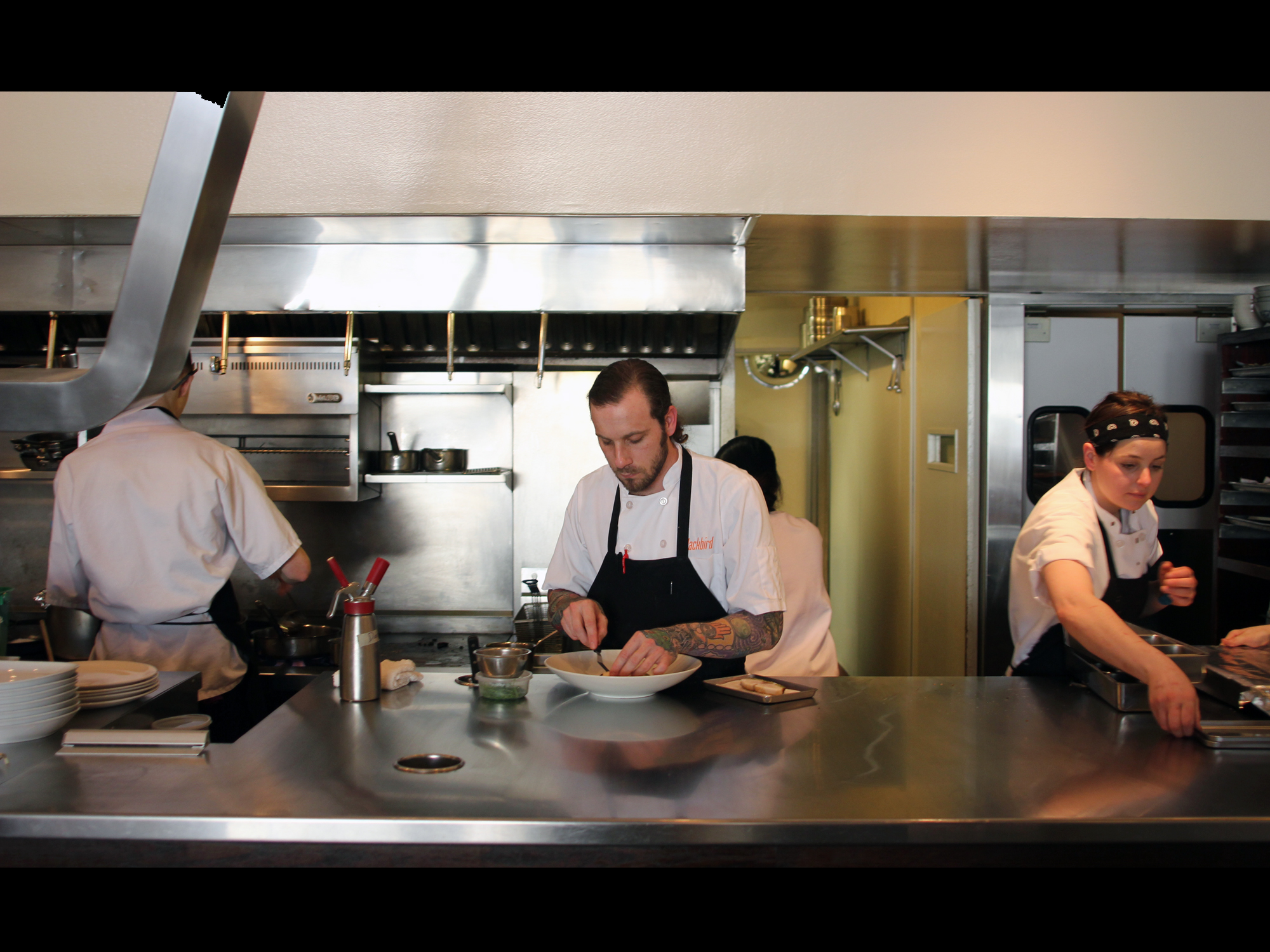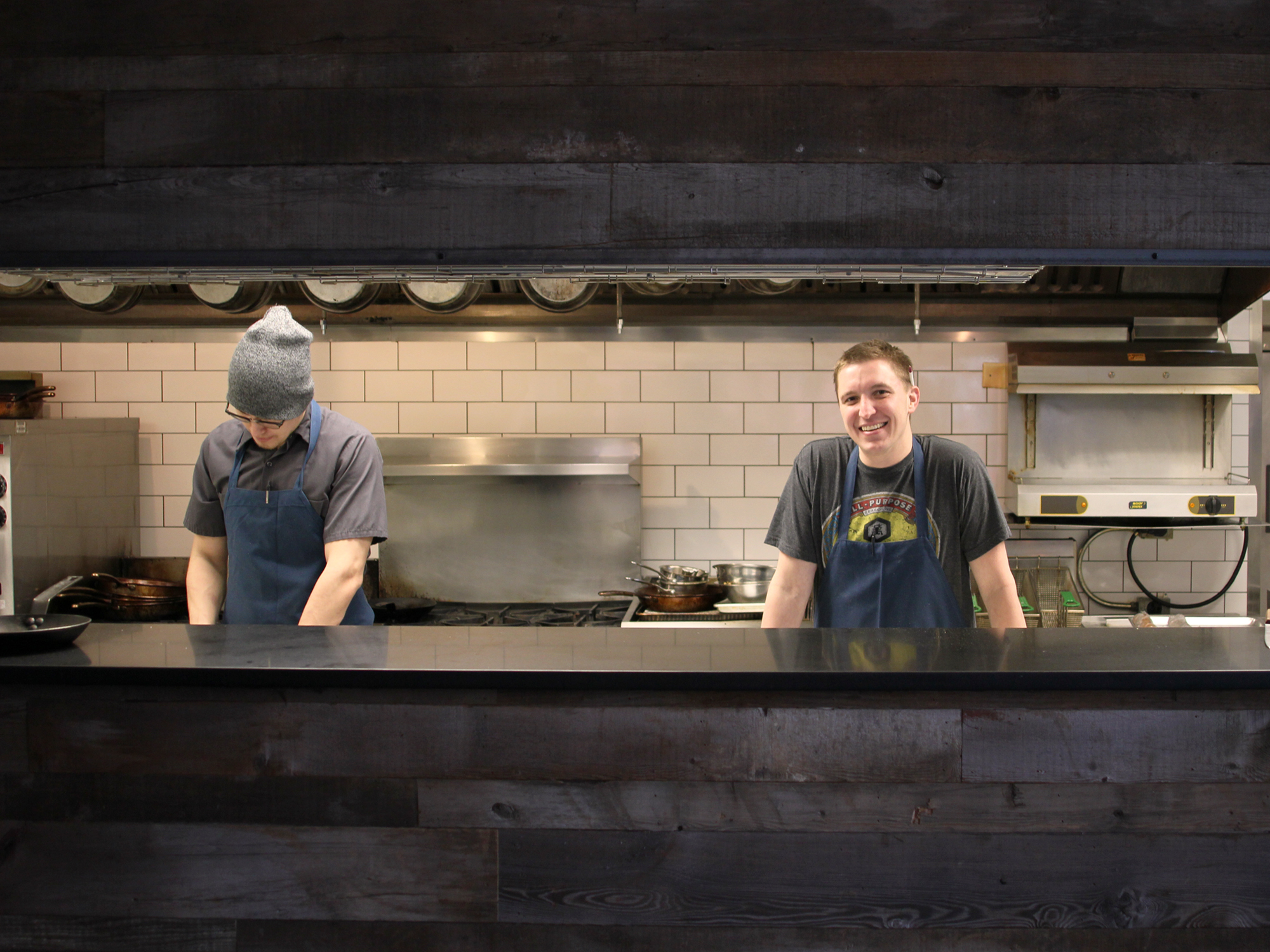CHEF CHRIS CURREN IS a grizzled veteran. You can see it in the bags under his eyes, the heavy way his tattooed arms fall across his chest. He looks, for a moment, like a weather-beaten statue happy to be out of the rain. In the large front room of Fulton Market Kitchen, where he was installed as executive chef in March, Curren settles into the plush bench and gives a tired, contented grin.
“It’s good to be back in the West Loop,” he says. “It fits my personality more than Michigan Avenue.”
He’s referring to his previous gig as chef of the high-volume Seven Lions, one of nine different kitchens he’s helmed during his long career in Chicago (plus another handful in his hometown of Cleveland). Being a veteran means adapting to change in an industry where restaurants come and go. It means working with countless other chefs and restaurateurs, many with strong personalities. It means walking into brand new kitchens, where anything can happen.
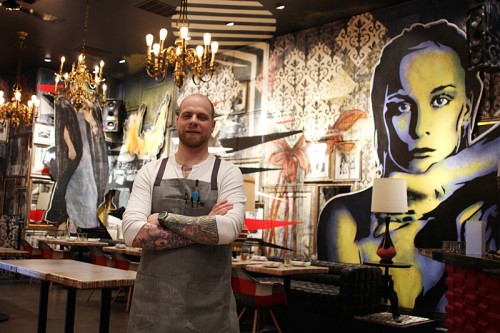
Chris Curren at Fulton Market Kitchen, 311 N. Sangamon
“It’s not as hard now,” he concedes, “but yeah: the single hardest day in your career is that first one at the head of a kitchen. You think you’re prepared for it, but you aren’t.” Now, he adds, his years of experience help him keep things in perspective. “When I walk into a new kitchen I know full well there’s gonna be people who don’t like me, don’t like what we’re doing, just don’t want to deal with the change because it’s a pain in the ass.”
He shrugs. “I like to bring people along if they want to come along.”
Curren speaks with an easy, deliberate rhythm: slow and thoughtful, like a sleepy college professor. “Each kitchen is a different challenge. You walk into a problematic kitchen, or a good kitchen looking for a change. You may have to build a kitchen from scratch.” He pauses, recalling. “I’ve done all of that.”
He looks around the high-ceilinged room, the well-stocked bar and lounge. A rotating selection of original art hangs on the walls; today an oversized painting of the Incredible Hulk looms over us. “This place isn’t a problematic restaurant.”
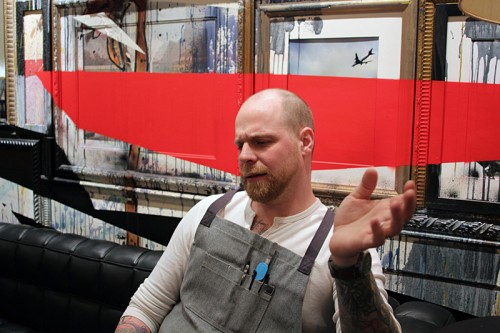
AN OLD WEST LOOP WAREHOUSE PAINTED in lighting bolt zebra stripes, Fulton Market Kitchen places an immediate emphasis on art in all forms. Curren’s new 25-item menu complements both a revamped beverage program and a robust commitment to supporting other artists throughout the space, a distinctive approach that helps the restaurant stand out in an increasingly crowded and high-profile landscape. It also means that Curren’s food is not the dominant attraction, but one key contributor to a larger creative whole. He admits that it’s an interesting challenge to merge the interests of the restaurant with his own ego.
You’re talking to me for a reason. That stress is with me all the time. Realistically, in this business all you have is your name.
“It’s one of my daily battles. An internal battle. I know that most people who walk through that door don’t know who I am, but my name does impact things in a certain way.” He leans forward with a quiet confidence. “You’re talking to me for a reason. That stress is with me all the time. Realistically, in this business all you have is your name.”
“At this point in my career I had options. And I was tired of trying to fit myself into someone else’s box.” It was FMK owner Daniel Alonso’s commitment to giving Curren creative freedom that persuaded him to take the job. “He gave me my budgets for food and labor and told me to go have fun. And it’s great to be able to bounce ideas off of people not just in the kitchen but the rest of the place, and the artists coming in. This is a good gauge for people to see what I can still do, for better or for worse.” He tempers the enthusiasm in his voice. “I’m trying to go for it. I don’t think we’re there yet, but we’re moving in the right direction.”
As thrilled as he is with the autonomy FMK offers, Curren’s long career underscores his willingness to fit into somebody else’s box. On a practical level, it means tailoring his own skillset to fit the needs of each new restaurant. “You’re always gonna go to certain techniques, certain flavor profiles. There are dishes that you keep in your repertoire, and tweak the theme here or there for whatever that restaurant needs.”
These standby dishes, he adds, help introduce new personality to the kitchen, establish the structure of the new chef and personnel, and let Curren feel out the clientele so that he can make new dishes specifically based on their wants. Now, he feels comfortable changing up to five dishes at a time, or 20% of FMK’s menu. Soon, the menu will fully reflect Curren’s primary attraction to the job: “I like being able to cook without the pressure of the outside stuff.”
“I like being hands on, working one-on-one in the kitchen. It’s zen, organic, me turning my brain off and just cooking.” He sighs contentedly. “It’s peaceful, but there’s a craft to it. Doing things the right way, with flavor and proper technique. Rustic, simple preparations that come from knowing the origins of ingredients. There’s soul and character in that kind of endeavor.”
Specifically, Curren hopes to keep things interesting but approachable. “I don’t use a lot of obscure ingredients,” he says, before describing a dish of monkfish stuffed with crab meat, curry coconut, and spring veggies. “All flavors that people understand. At its heart, an approachable, understandable dish.” He pauses. “Something can be comforting and refined.”
Gallery: Chris Curren’s dishes at Fulton Market Kitchen
Photos by Kailley Lindman
He goes on to describe smoked fingerling potatoes with pickled green onion mayo, dill, and black garlic vinaigrette. Seared tuna, sweet and sour jus inspired by borscht, and creme fraiche. Smoked beef and Brussels sprout kraut. Eastern European flavors throughout. Again he pauses, thinking about ingredients.
“Spring is my favorite season,” he says. “English peas. My grandfather owned a farm, with a one-acre garden in his backyard. I remember being really little and shucking peas in my grandma’s kitchen on Sundays for dinner. And every spring I sit in my kitchen and shuck peas and it takes me back to that time and place.”
It is obvious that Curren finds comfort in reflecting on his own past, one filled with both success and disappointment. I ask him if it’s ever difficult to continually invent new dishes, at new restaurants. “Each kitchen is a different challenge, and that’s part of the fun of it.” His shoulders sag a little, weather-beaten again. “But it’s hard. The long hours are hard on you. The sacrifices to your personal life.”
And what about the difficulty in each transition? “It’s usually excitement, because I’m making a change for the better, regardless of how it ends. Honestly, I remember leaving each of those kitchens excited about the future.” The look on his face, however, betrays the words he speaks.
“With the exception of closing my kitchen,” he finally adds. “That was everything I had for four years.”
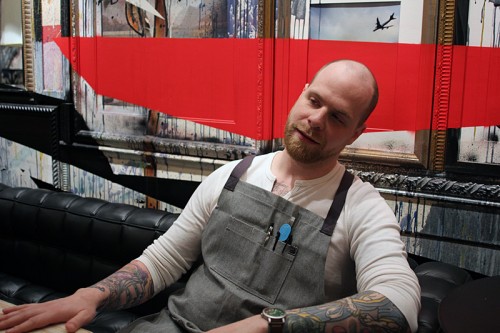
FANS OF BLUE 13 HAVE SOUGHT Curren out here in the West Loop. “They’re excited I can get back to doing my own thing.” He thinks back, bittersweet. “At Blue… once people walked in the door that first time, we had them. They’re coming back. 75% of our business was repeat customers. That’s always been my focus, the goal.”
And for four years he did all the right things. When Blue 13, which Curren built from scratch, opened in 2008 it earned instant praise, a Michelin recommendation, and nominations for “Rising Star Chef” and “Best Fine Dining Restaurant” from the Jean Banchet Awards. It was the kind of restaurant that made Chicago dining exciting. But 2008 was also the beginning of the largest American financial crisis since the Great Depression. People cut back on dining out, and soon Blue 13 was gone.
A journeyman like Curren knows the ups and the downs. And lasting this long leaves some scars. The wounds of hard luck, hard-fought gains, and the unavoidable passage of time. He mentioned being happy to be back in the West Loop; he lived in the neighborhood when he first moved to the city from Ohio. “When I lived here there was much less going on. The Publican had just opened up, Moto was the mainstay. It was dangerous at times.”
“Now it’s a destination.” He smiles and raises his arms in easy triumph: today he shares the stage with Chicago’s greatest chefs. “Yeah, it’s ego-driven to a certain extent. I want to prove myself: I have a story I want to tell. But I think I fit into other concepts well also, because I get excited about doing different things. FMK is a cool concept.”
Chris Curren is very happy to be here, in the moment.
The grizzled veteran is ready for another round.
Vincent Labriola is a freelance writer and filmmaker from Chicago. He created the blog The Midwestern Diner, and produces independent narrative and documentary media via his company Stratovolcano.
Latest
Join the Discussion
After you comment, click Post. If you're not already logged in you will be asked to log in or register with Disqus.










